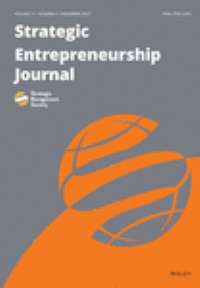手工艺在家族企业战略发展中的演变
IF 6.3
2区 管理学
Q1 BUSINESS
引用次数: 0
摘要
研究摘要以人性化工作方法为特点的手工艺企业面临着坚持纯手工艺原则与拥抱工业化之间的矛盾。在家族控制的手工艺企业中,这种挑战更为严峻,它们既要努力坚持传统,又要适应变化。本研究通过对第三代家族工艺企业图恩(Thun)的案例研究,探讨了工艺工作如何沿着企业发展的轨迹演变。我们确定了一套机制和四种配置--纯粹配置、技术配置、叙事配置和生态系统配置--手工艺品随着时间的推移不断演变。这些构型不仅保留了传统,还为传统注入了创业精神、重新诠释和深度创新。这项研究超越了静态视角,揭示了不同手工艺配置之间的动态相互作用,为手工艺工作文献做出了贡献。我们对第三代家族手工艺企业图恩的研究通过确定一系列机制和四种配置--纯粹、技术、叙事和生态系统--为管理者提供了实用的见解,这些机制和配置显示了手工艺工作如何随着时间的推移而演变。管理者可以利用这些构型来平衡传统与创新,并为工艺流程注入企业精神。我们的研究结果强调了管理这种平衡对于可持续竞争力的重要性,以及培养同时支持手工和工业生产的企业文化的重要性。我们的研究还为寻求战略发展的手工艺企业提供了实用指南,确保传统与当代企业发展相结合。本文章由计算机程序翻译,如有差异,请以英文原文为准。
The evolution of craft work in the strategic development of a family enterprise
Research SummaryCraft firms characterized by a humanistic approach to work face a tension between adhering to pure craft principles and embracing industrialization. This challenge is heightened in family‐controlled craft firms, striving to uphold tradition while adapting to change. This study examines how craft work evolves along the trajectory of entrepreneurial development through a case study of Thun, a third‐generation family craft firm. We identify a set of mechanisms and four configurations—pure, technical, narrative, and ecosystemic—through which craft work evolves over time. These configurations not only preserve traditions, but also infuse them with entrepreneurial spirit, reinterpretation, and deep innovation. This study contributes to the craft work literature by moving beyond static perspectives and revealing the dynamic interplay between different craft configurations.Managerial SummaryCraft firms, which emphasize a humanistic approach to work, often struggle with the tension between preserving traditional craftsmanship and embracing industrialization. Our study of Thun, a third‐generation family craft firm, provides practical insights for managers by identifying a set of mechanisms and four configurations—pure, technical, narrative, and ecosystemic—that show how craft work can evolve over time. Managers can use these configurations to balance tradition and innovation, and inject entrepreneurial spirit into craft processes. Our findings underscore the importance of managing this balance for sustainable competitiveness and fostering an entrepreneurial firm culture that supports both artisanal and industrial production. Our study also provides a practical guide for craft firms seeking to evolve strategically, ensuring the integration of tradition with contemporary entrepreneurial development.
求助全文
通过发布文献求助,成功后即可免费获取论文全文。
去求助
来源期刊

Strategic Entrepreneurship Journal
Multiple-
CiteScore
11.10
自引率
1.60%
发文量
31
期刊介绍:
The Strategic Entrepreneurship Journal is a research journal that publishes original work recommended by a developmental, double-blind review process conducted by peer scholars. Strategic entrepreneurship involves innovation and subsequent changes which add value to society and which change societal life in ways which have significant, sustainable, and durable consequences. The SEJ is international in scope and acknowledges theory- and evidence-based research conducted and/or applied in all regions of the world. It is devoted to content and quality standards based on scientific method, relevant theory, tested or testable propositions, and appropriate data and evidence, all replicable by others, and all representing original contributions. The SEJ values contributions which lead to improved practice of managing organizations as they deal with the entrepreneurial process involving imagination, insight, invention, and innovation and the inevitable changes and transformations that result and benefit society.
 求助内容:
求助内容: 应助结果提醒方式:
应助结果提醒方式:


